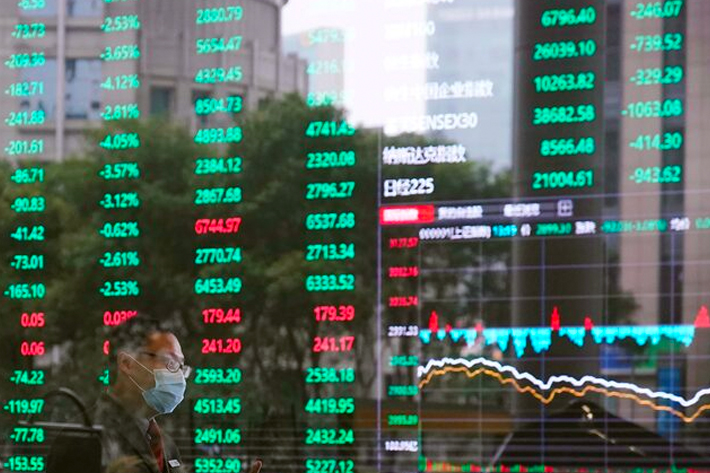Stock markets across Asia fell on Friday as the selloff of tech and AI stocks continued in the US and around the world.
The Nikkei dropped by 1.8% in Tokyo, while China and Hong Kong stocks fell by the most in nearly a month after the overnight tumble on Wall Street and China’s weak economic data soured sentiment.
China’s blue-chip CSI300 Index closed down 1.6%, while the Shanghai Composite Index lost 1% after touching a 10-year high. Hong Kong benchmark Hang Seng 1.9%. Their daily performance was the worst since October 17.
ALSO SEE: EU Keen to Stem Flood of Cheap China Parcels From Shein, Temu
Investors also bit their nails over the fate of China’s top securities regulator, after sources told Reuters that Wu Qing, chairman of the China Securities Regulatory Commission (CSRC), has sought approval to step down, citing health reasons.
Tech shares led the decline, following a Wall Street sell-off in Nvidia and other artificial intelligence heavyweights that was partly triggered by reduced odds of a December US rate cut.
China slowing down
The mood was further darkened by data showing China’s economic recovery is losing momentum.
China’s factory output and retail sales grew at their weakest pace in over a year in October, while new home prices fell at the fastest monthly pace in 12 months. It follows Thursday’s release of dismal credit data.
“Slowdown across the board,” Macquarie wrote in a note to clients, adding China’s “sluggish demand remains the key issue.”
But the bank expects no major policy response by the year-end as China is on track to meet its growth target of around 5% this year. “As long as policymakers could achieve the growth target, they could tolerate the weakness in domestic demand,” Macquarie said.
In China, chip-making, consumer electronics and AI were among the worst performers. In Hong Kong, the biggest losers included media, Internet and consumer stocks.
Tech stocks drag Nikkei lower
Mounting concern over sky-high valuations for tech and AI stocks was key to the Nikkei’s 1.8% fall, while the broader Topix lost 0.7%.
Artificial intelligence-linked firms led the drop, with chip-testing equipment maker Advantest falling 5.5%, startup investor SoftBank Group sliding for a third day – down 6.6% on Friday – and chip-making tool manufacturer Tokyo Electron shedding 6.1%.
Stocks linked to data centre expansion also retreated, with Hitachi and Fujikura down 5% and 6.4%, respectively.
“It looks like investors are taking profits on these AI-related stocks,” as worries about stretched valuations simmer, said Nomura Securities strategist Fumika Shimizu.
“We are seeing a bit of sector rotation,” particularly into companies that have posted strong earnings this season, she added.
Paper company Toppan Holdings soared 14% and property developer Tokyo Tatemono jumped 10.4% on robust financial results, becoming the Nikkei’s two biggest percentage gainers on the day.
Valuation worries around the AI narrative have driven dips in shares globally all month. A flashpoint could come next week, with AI bellwether Nvidia reporting earnings on Wednesday.
Meanwhile, stocks in Seoul fell as much as 3.8%, snapping a four-day winning rally, and equities in Taiwan fell around 1.8%, on track for their second session of losses.
Emerging Asian equities also slip
In Sydney, the ASX index fell by 1.4%, but India’s BSE Sensex and the Nifty 50 were two of just a small handful of Asian exchanges that managed to avoid a fall, ending with slim 0.1% rises near the end of trading after results of the Bihar state election were revealed.
Emerging Asian equities were mostly hit by the global risk-off wave after hawkish Federal Reserve remarks dimmed hopes of a rate cut next month, with Singapore stocks down from record highs after a three-session surge.
The MSCI index of emerging Asia equities and a broader gauge of Asian shares outside Japan each dropped about 2%, while the MSCI ASEAN index fell 0.8%.
An increasing number of Fed policymakers are striking a more cautious tone on further rate cuts, pointing to persistent inflation and a labour market that has held firm despite two US reductions earlier this year. Markets have priced in over a 50% chance of a hold in interest rates at the Fed meeting in December.
“The moves set up global markets for a bearish end to the week, where thoroughly risk-off sentiment is likely to see risk assets everywhere come under pressure,” said Kyle Rodda, senior financial market analyst at Capital.com.
Singapore’s FTSE Straits Times index fell over 1%, pulling back from its record high of 4,575.91 points it hit on Thursday, although it still remained above the 4,500-point mark.
In Thailand, shares declined as much as 1.9% to their lowest level since September 5.
And in Malaysia, the ringgit remained steady with a decline of 0.1% to snap an eight-day gaining streak, while equities dipped 0.3%. The country’s central bank said the economy expanded at its fastest pace in a year in the third quarter, with growth in 2025 poised to come in at the upper end of its forecast.
Currencies elsewhere in the region were mostly muted, with Indonesia’s rupiah paring earlier gains and edging 0.1% higher to end a three-day losing streak, while the Philippine peso reversed course to slip 0.2%.
Investors are now looking ahead to a busy week of economic releases, including Bank Indonesia’s policy rate decision and Thailand’s third-quarter GDP figures.
- Reuters with additional editing by Jim Pollard
ALSO SEE:
Big Tech to Freeze Australian Children’s Social Media Accounts
$10bn in Outflows From Asian Stocks This Month as AI Rally Slows
Japan’s New PM Working on ‘Bold’ Stimulus Package, Draft Shows
China’s BYD Targets Sale of 1.6m EVs Abroad in 2026: CitiBank
Germany to Review Its Policies on China, As Trade Tensions Rise
As Typhoons Lash Southeast Asia, COP30 Hunts Adaptation Finance
Bridge Collapse in Southern China Linked to Dam in Seismic Zone
























